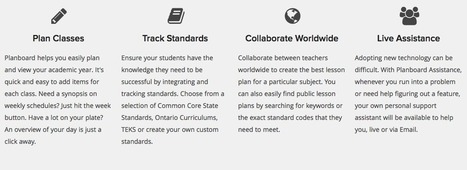by Emre Firat
Even though I am a technology fan, I still use papers to create plans for my lessons and to write notes for my own use. There are lots of digital applications but none of them has made me feel comfortable so far. Yesterday I discovered a new tool, the “Planboard”
Planboard is a very simple tool that you can use to create your daily, weekly and monthly plans. Signing up and creating a template takes only 3 minutes.
With Planboard you can;
- print or e-mail your plans or save them as PDF files,
- add memos, sticky notes for yourself,
- add Standards for each lesson period,
- attach files for every lesson,
- set off-days or shift your schedule without any change.



 Your new post is loading...
Your new post is loading...









